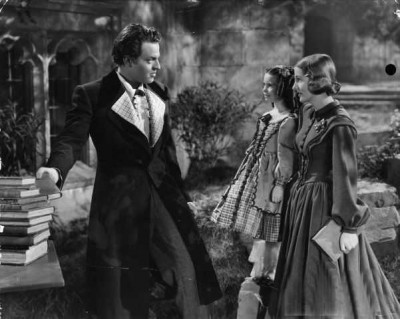
The 1944 version of Jane Eyre is easily the most gothic—verging on gothic horror—of all movie takes on the novel. That also makes it the most exciting and entertaining of the lot. The brooding black-and-white imagery with its clever, effective use of model work—all aided by Bernard Herrmann’s score—gives the film a truly sinister air, and that’s something that was lacking in the most recent attempt at bringing Charlotte Brontë‘s novel to the screen. There’s something about classic-era studio-filmmaking artistry that’s peculiarly suited to the gothic-romance absurdity of the story—something that makes the whole business of a young governess, a brooding master with a secret tragedy, and mad woman locked away in the recesses of his home seem plausible. Or at least makes it seem plausible while it’s on the screen. And then there’s the presence of Orson Welles himself. As is often the case with projects on which Welles played a significant role, the question has always hovered over Jane Eyre as to the extent of his involvement in the creation of the film. In this case, the question is compounded by the fact that Welles had already done a radio version of the book for his Mercury Theater of the Air program. The Herrmann score and the presence of Agnes Moorehead in the cast and John Houseman as one of the screenwriters enhances the feel of it being a Welles film. All this combined with the look of the film certainly suggests Welles’ style far more than it does the work of credited director Robert Stevenson, the man who would go on to become the efficient, faceless, personality-free house director for Walt Disney’s live-action films. However, Stevenson always claimed it was his work, not Welles’—so, what is one to think? Well, let’s just say Jane Eyre has more in common—for whatever reason—with Citizen Kane than it has with The Misadventures of Merlin Jones.




Before you comment
The comments section is here to provide a platform for civil dialogue on the issues we face together as a local community. Xpress is committed to offering this platform for all voices, but when the tone of the discussion gets nasty or strays off topic, we believe many people choose not to participate. Xpress editors are determined to moderate comments to ensure a constructive interchange is maintained. All comments judged not to be in keeping with the spirit of civil discourse will be removed and repeat violators will be banned. See here for our terms of service. Thank you for being part of this effort to promote respectful discussion.